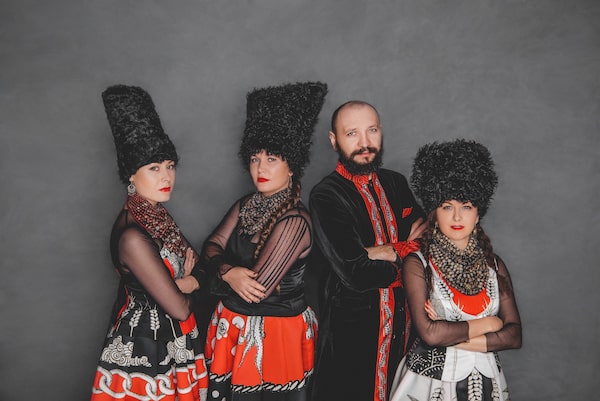
DakhaBrakha formed in 2004 at Kyiv’s avant-garde theatre Dakh by director Vladyslav Troitskyi, the quartet offers a vibrant mix of infectious melodies, folkloric polyphonies, resonant rhythms, and sounds referencing hip hop, West Africa, the Middle East, South Asia, and Indigenous Australia.Vitaliy Vorobyov
When DakhaBrakha returned to their native Ukraine from a European tour on Feb. 23, 2022, they were scheduled to soon depart for more dates. But, one day later, Russia invaded, and everything changed. The folk-rock band’s twin missions – to entertain and educate – have intensified since that time.
Formed in 2004 at Kyiv’s avant-garde theatre Dakh by director Vladyslav Troitskyi, the quartet (whose name means “give/take” in old Ukrainian) offers a vibrant mix of infectious melodies, folkloric polyphonies, resonant rhythms, and sounds referencing hip hop, West Africa, the Middle East, South Asia and Indigenous Australia.
Group members Nina Garenetska, Marko Halanevych, Iryna Kovalenko and Olena Tsybulska (the band’s female members are trained ethnomusicologists) play a range of instruments including cello, accordion, piano, trombone, zgaleyka (a Slavic wind instrument), djembe (an African drum) and didgeridoo (an Aboriginal Australian wind instrument). Through six albums and numerous tours (including an appearance at the Festival International de Jazz de Montreal last July), the band’s onstage aesthetic remains consistent: dark conical hats, multi-strand necklaces and patterned fabrics, all reflecting their self-labelled “ethno-chaos” brand.
Touring has resumed for the band, which had stops in Toronto and Ottawa and will visit Duncan, B.C. (March 17), Vancouver (March 18), and Victoria (March 19). Chants of “Stop Putin! No to war!” which became a regular refrain at DakhaBrakha’s concerts following Russia’s 2014 annexation of Crimea, have taken on a new urgency.
The Globe and Mail spoke with band member Halanevych, who explained why the connection between art and politics has never been clearer.
How did the events of February, 2014 – and February, 2022 – alter your creative approach?
If one considers creativity to be the actual creation of music, then we do not yet know if our approach has really changed since Feb. 24, 2022. We haven’t had a single rehearsal since that day, and we haven’t created a single composition. Perceptions of art atrophied in the first months after the great invasion: [we couldn’t] read books, or watch movies, or listen to new music; at the time the war captured and filled our brains and hearts. But some defence mechanisms have been activated so that we don’t go crazy, and nowadays, we are ready to accept art, and to rejoice in doing it, even though the war continues and we spend a lot of our emotional energy reflecting on that.
What do you think of the attitude that music shouldn’t be political?
If a person lived in a pressure chamber, without knowledge of the surrounding world, and heard some music, he or she could perceive it without any context, in its pure form. Ordinary people live differently; we are influenced by knowledge and empirical experience. After World War II, Jewish people could not perceive and listen to Wagner’s music – this is a rather acute example where context affects the perception of art. Art is not outside of politics; it is a factor within politics itself. Even the music of Tchaikovsky, who lived many years ago and has Ukrainian roots, today serves Putin’s imperial propaganda purposes.
To what extent do you feel like cultural ambassadors for your country?
We are often called cultural ambassadors, but to be honest, we have a constant feeling that we need to do more and be more efficient. We started out in the theatre and that experience has had a big impact on us; that theatrical approach applies both to the construction of our concerts and to the musical compositions themselves. It’s something both critics and ordinary people alike notice.
How has your connection with past and present Ukrainian artists evolved?
Our current onstage costumes are from the Lviv studio Karp. We try to change them from time to time – only the hats remain unchanged. [Scoring the music for] Alexander Dovzhenko’s movie Zemlya [Earth] was a landmark for us; it was a real test and challenge. We get invitations for these sorts of projects all over the world. Before the beginning of the great Russian aggression, a big concert with a symphony orchestra was planned for us under the leadership of [Ukrainian] conductor Oksana Lyniv. We had already started working on it when Russia invaded. As a result, the project has been postponed indefinitely.
What is your process of composition? Does improvisation play a role?
Our concept is to mix different musical stylistic elements – mixing is our true element. We are not afraid to do it, and we enjoy it, but it is important to find harmony in all of it. So we listen to [sounds from around] the world, absorb the best ones and combine them with our natural Ukrainian roots. As for improvisation, we hardly consider ourselves to be outstanding jazz improvisers. However, improvisations do arise by themselves, and we are happy for such situations – and the public doesn’t seem to mind, either!